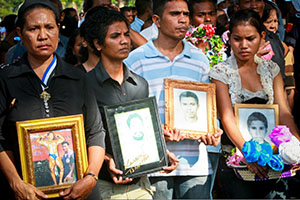
« On this international day, I urge all Member States to ratify or accede to the Convention without delay, and I call on the States parties to the Convention to implement it. It is time for an end to all enforced disappearances.”
Secretary-General Ban Ki-moon
Enforced disappearance has frequently been used as a strategy to spread terror within the society. The feeling of insecurity generated by this practice is not limited to the close relatives of the disappeared, but also affects their communities and society as a whole.
Enforced disappearance has become a global problem and is not restricted to a specific region of the world. Once largely the product of military dictatorships, enforced disappearances can nowadays be perpetrated in complex situations of internal conflict, especially as a means of political repression of opponents. Of particular concern are:
– the ongoing harassment of human rights defenders, relatives of victims, witnesses and legal counsel dealing with cases of enforced disappearance;
– the use by States of counter-terrorist activities as an excuse for breaching their obligations;
– and the still widespread impunity for enforced disappearance.
Special attention must also be paid to specific groups of especially vulnerable people, like children and people with disabilities.